There’s One Born Every Minute: Black Sky Thinking About Crypto-Currencies
Monday, 18 December 2017By Ian O Angell
Let me start with two quotations, the first “There's a sucker born every minute”, Phineas T. Barnum. More of this later. The second, and apparently contradictory quotation is Victor Hugo's “Nothing is more powerful than an idea whose time has come”. And what is this powerful idea? Private money!
“Money does not have to be created legal tender by governments. Like law, language and morals it can emerge spontaneously. Such private money has often been preferred to government money, but government has usually soon suppressed it”. It remains to be seen whether in the age of the Internet, governments can keep on suppressing it, and who if anyone will benefit.
Money addresses the thorny question of value: money is the commodity whereby value is expressed as price. All it takes to create a currency is a shared sense of trust. Hence my definition of money: any self-referential system of exchange tokens that its community of users believes to be, and uses as Money. In devising their loyalty schemes, supermarkets are in effect issuing ‘plastic money’. Companies can go much further. Perhaps the real issue is not “dollar bills, but Bill’s dollars”: Bill Gates’ dollars. Each corporation can issue a proportion of its equity as digital cash. Alternative currencies can spring up anywhere.
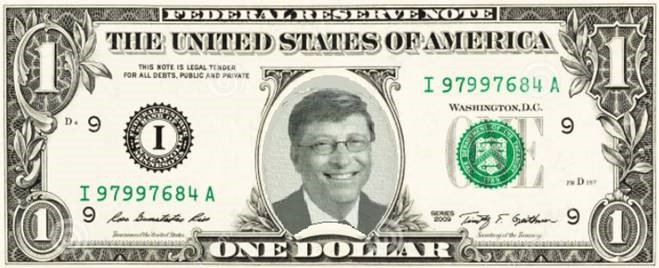
All it takes is a demand, like for the world’s oldest occupation. I am passing a token around the table that was issued by the Chicken Ranch, in La Grange, Texas. The best little whorehouse in Texas, made famous in the 1982 film starring Burt Reynolds and Dolly Parton. And what exactly does this token buy? The reverse side spells it out: Good for All Night”. There’s nothing new under the sun. Michael Mainelli informed me that in ancient Sumeria, 1 shekel bought a night in the temple with a priestess.
So why should we trust state money? The history of such money is one of political meddling. State (and more recently Central Bank) inspired inflation is as old as money itself; from ancient Babylon, to 14th century China, to the ‘Great Debasement’ of Henry VIII, to the Weimar Republic. Right up to present day. And let’s not forget Zimbabwe that puts sell-by dates on their notes.
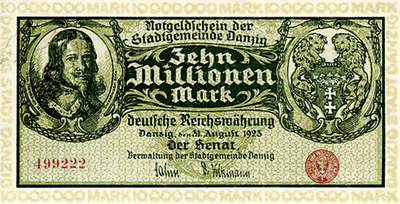
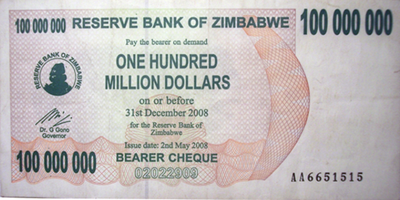
Debt-based state-backed fiat money, facilitated by the banks, are in a permanent state of unstable equilibrium. If too many customers demand the return of their cash or default on their loans, then banks will collapse. We saw both situations in the winter of 2007/2008 when problems with US sub-prime mortgages triggered the financial woes of Northern Rock, Lehman's, and many other global financial institutions.
However, governments needn’t be the sole issuer of money. Private money can appear spontaneously. In the 1780s cash shortages in Britain were critical. Enter the Parys Mines Company. From 1787 their Birmingham mint manufactured penny, halfpenny and farthing tokens, initially to pay the workers at their copper mines at Parys Mountain on Anglesey. Very soon they were accepted everywhere, because their value was redeemable as gold/silver coin of the realm on demand at any company office. Subsequently a number of different companies produced token coinage, although not all of it was honest.
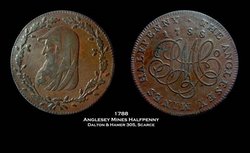
George Selgin in ‘Good Money’, his excellent book on the topic, argues that without private tokens, and it had all been left to the government, then the Industrial Revolution would never have taken off in Britain. Successive governments hated the notion of private coins, and these were finally banned following an official re-coinage in 1816.
Governments have always been ambivalent to money, even their own issue. As far back as Plato’s moneyless utopian Republic, governments have wanted their currencies to be non-convertible, in order to protect their economies from external forces, and to prevent wealthy dissidents escaping state oppression. The only reason they tolerate fiat currency is because it is primarily a system of tax tokens. All other uses are secondary.
And then along come Bitcoin, Ethereum and over 1300 other crypto-currencies, with the potential to make state money obsolete. Crypto-currencies are built on a shared, decentralised digital ledgers and exchanged in peer to peer networks. They are essentially distributed databases of unchangeable, digitally recorded data, secured by cryptography, but with no central control. Which is what makes virtual currencies so attractive to criminals. Bitcoin for example has been used to pay for ‘pharmaceuticals’, using sites like Silk Road that spring up on the Dark Net. There have been numerous scandals, questions about thefts and money laundering.
Despite all the shenanigans, the price of Bitcoin keeps going up and up. Its critics say Bitcoin is a glorified Ponzi scheme … but then isn’t all fiat money? Nevertheless, many see the huge potential advantages and commercial opportunities of crypto-currencies, but all the while politicians fear a possible loss of control over citizens.
Let me give you a prediction. Governments will eventually wholeheartedly back crypto-currencies. They will of course attempt to regulate the space. I predict that within a decade many governments will be attempting to issue their own crypto-currencies using MDL protocols, not always successfully. By running the money system, they can spy on everyone. In jest Don Tapscott talks about Britain issuing Britcoins! It’s no joke!
The vision is for citizens to apply for government-run e-wallets with access to mutually distributed ledgers, which will facilitate transactions in the state-run crypto-currencies … this becomes a de-facto identity card. Think of the benefits. Thousands of government computers will use their spare capacity to do the `mining`, simultaneously verifying the legitimacy of transactions. So the only costs will be for the software. Who knows what else the state will do with the data now suddenly made available?
No minting coins or printing banknotes. No more counterfeiting, since each payment will be traced through the chain of blocks back to its original point of issue. As an inducement governments can run a national savings scheme on the wallet, with owners paid interest on balances. Furthermore, the state will have a complete record of who is trading with whom, and build up a map of criminal associations. And they can seize back taxes and fines by simply cancelling the e-coins.
Money will be convertible only in recognised online centres. The wallets will be available only to citizens and legitimated organizations, and the crypto-currency can be spent only within the national jurisdiction. Consequently capital flight is stopped in its tracks. Plato’s objections to money will finally disappear.
Small nations, which are reliant on the dollar, can issue their own crypto-currencies. Estonia is already experimenting with its own currency and passports, all built with MDLs. The MDL revolution has only just begun. But what are the implications of Blockchain? Only one thing is certain. We’re in for a bumpy ride.
Which applications will work, and which will fail? Bitcoin itself is facing one major problem – scaling. Latest figures show it takes seven minutes to legitimate a transaction. And this is with a relatively tiny number of users, mostly speculators who are sitting on their coins, so transactions are minimal. Can a national currency cope, given the vastly bigger number of users, and its use in micro-payments? I doubt it very much. Checking the legitimacy of a transaction is an exponentially increasing problem of order n squared.
As for Bitcoin, here come the suckers, the latecomers to the party, buying in to what they think is a sure-fire winner. To date the price is defying economic gravity. Bitcoin has stopped being a currency, and is now pure speculation. It’s just like the situation mentioned in Michael Mainelli and Ian Harris’s book, the Price of Fish. You daren’t look too closely at what you are buying, because it is quietly rotting away. Bitcoin is a classic bubble, and there’s one born every minute buying in to the lie. It won’t end well.
Bitcoin will eventually fail, and sooner rather than later. But the simple fact is, it has let the cat out of the bag. The attraction of a national crypto-currency is obvious, and if it works, it can erode three highly valued properties of cash – its anonymity, fungibility, and ability to store value. Governments will then facilitate “the complete delivery of the individual to the tyranny of the state, the final suppression of all means of escape not merely for the rich, but for everybody”. The high street bank is already a secret policeman. Bank workers are called ‘tellers’, because they tell the government everything.

This control is necessary because of the explosion in the number of government jobs across the west, or should that be non-jobs, at the cost of destroying real jobs, namely those in the private sector. Today in the US there are nearly twice as many workers in government (22.5 million) than in all of manufacturing (11.5 million). In 1960, there were 15 million in manufacturing, and only 8.7 million paid by government. To cover the ever-increasing bills, the political rhetoric across the West is to make both companies and the wealthy pay their “fair share” of taxes.
How dare they? In America the top 1% of the population pay 40% of income tax revenues. In the UK I believe the figure is around 27%, and half the workforce pay no income tax. The wealthy are also at the mercy of excessive regulation. Forget about computer hackers; government regulations are the ultimate denial of service attack on the corporate sector.
In the past the wealthy have stayed put, but only because they thought they could evade taxes. Not any more. Governments now have the technology to spy on everyone. The politicians have forgotten Thomas Jefferson’s warning: “Merchants have no country. The mere spot where they stand on does not constitute so strong an attachment as that from which they draw their gain”. In the age of the Internet everyone is a merchant. The rich can leave a country just as easily as they enter it, looking for arbitrage benefits. The umbilical cords have been cut; the globalized individual/company no longer feels the need to support the national aspirations of the country of its birth.
Every quarter since 1994 the US government has thoughtfully listed both those US citizens who have renounced their citizenship, and the long-term residents who have ended their US resident status, because of federal tax reasons. Clearly all these people are very rich; the average Joe doesn’t have a tax incentive to leave. The original political thinking by Congress was that such a list would `name and shame` those included, and this would frighten off others thinking of leaving. Talk about being deluded! In 1998 the figure was 398, in 2013 it was 3001. In 2017 it is 6811. More and more High Net Worth Individuals are considering jumping ship before the US government introduces legislation to make it more difficult/expensive to give up their passports in order to save on tax.
In the UK the rich are acutely aware that a devaluation of sterling is on the cards – as the only way out of the impending nightmare of public sector pensions.
The wealthy have the resources to revolt against this tyranny. The search is on to find a form of money that is anonymous, fungible, that stores value free from government interference, and most importantly keeps that value. Investors are looking beyond national currencies, and/or gold and silver, to include raw materials, commodities, and who knows what else.
In the City of London, Long Finance is a discussion project searching for the Eternal Coin. The eternal coin is “a thought experiment that speculates on whether a coin that never loses value could exist, and, if such a coin could exist, how it might be constructed”. One option is to use the World Currency Unit (WOCU), a standardized basket of currencies of the 20 largest national economies measured by gross domestic product. To succeed, all a currency needs is a community of trust, and the WOCU/Eternal Coin has a ready-made community among the wealthy about to flee.
The rich are jumping at the chance to escape from the confidence trick of fiat currencies. All national currencies are viewed with suspicion. The GoldMoney Foundation established in 2010 by a leading global provider of precious metals, safeguards nearly $2 billion of customer assets. It is highly critical of the way national currencies are managed and expound the merits of “economically sound and politically honest money” tied to gold and silver. Their use of the words “politically honest” says it all. The rich don’t trust governments with ‘their’ money.
The politicians nightmare is a private crypto-currency run for the sole benefit of the super-rich. Bitcoin is proof of concept for small-scale currencies. And when money is virtual using MDLs it’s much easier to hide. Hayek’s vision of the Denationalisation of Money can now become a reality. Then buying and selling goods and services within a self-referential community becomes a form of transfer pricing, which is invisible to the taxation authorities. The term ‘Capital Flight’ will soon take on a whole new meaning.
A crypto-currency for the small number of super rich is an idea whose time has come. Bitcoin is an instance of what I predicted way back in 1998, in an article I published in the Financial Times. You don’t need to bank money offshore any more, you can leave it online, denominated in virtual currencies, and hiding in a cloud. Money launderers no longer skulk around racetracks and betting shops. Wealth could be digitised, anonymized, and moved to the deregulated common grounds of space, to what William Rees-Mogg called “the greatest tax haven of them all, Bermuda in the sky with diamonds” … and Blockchains!
Although international law and domestic law apply to the ‘Global Commons’ according to the 1967 Space Treaty, firms can choose which domestic legal order is most favourable and convenient. The virtual reality of off-planet commerce beckons.
At first glance such an illegitimate offspring of the ‘flag of convenience’ and ‘pirate radio’ looks like a silly idea. But even poor countries can get in on the action – they merely act as tax-havens and data-havens for footloose firms and individuals. There are no barriers to entry. Previous disadvantages of the Third World, like bribery, corruption, incompetence and political instability, are obstacles no longer; since, except for a brass-plate, a company has no physical presence there – business is all off-planet. The G-7 cartel can no longer use its technological superiority to keep the rich pickings for themselves. The OECD is already crying foul over the “unfair lowering” of tax rates and a “race to the bottom” that could lead to “fiscal degradation” of the tax base. Off-planet commerce will service any (information) product that can be dematerialized.
A satellite acts as a depository for digital cash. Customers also send the digital safe that secures it - and they hold the only key. The very notion of property is changing with its virtualization. Bitcoin is only the beginning.
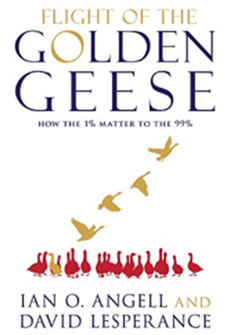
One of my ex-students, Pavlo Tanasyuk, is CEO of a digital currency company, called Monexy. He’s developing a currency for the City of London. He has obviously been influenced by my lectures and has recently bought space on a satellite to experiment with off-planet currencies. Off planet currencies may be the only safe haven as the money systems in the West are failing, resulting in countries degenerating from being policed states, into police states – moving along the Road to Serfdom from democracy to tyranny, just as Plato predicted. The western life style of the past half-century, of excesses for many citizens, the envy of the rest of the world, is rapidly becoming a thing of the past.
The super-rich are on the move. The Freedom Ship intends to sail the oceans avoiding any tax obligations for its passengers. In October 2016 the Russian billionaire, Igor Ashurbeyli, announced the Space Nation of Asgardia, located on a satellite. No doubt he will be issuing passports based on MDLs This is just the start.
Read all about what the super-rich are doing in response, in my latest book co-authored with Canadian tax lawyer David Lesperance: the Flight of the Golden Geese!